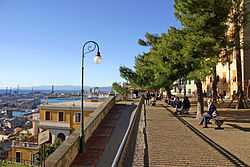Castelletto (Genoa)
From Wikipedia, the free encyclopedia

The belvedere of Castelletto.

Bridge-aqueduct.
Castelletto is a residential quarter of Genoa, north-western Italy. It occupies a hilly area which, until the 17th century, it was outside the city walls.
The quarter is included in the city's Municipio I Centro Est and includes three urban units (Castelletto, Manin and San Nicola). As of 31 December 2010, they had a total population of 28,857. The name, meaning "small castle" in Italian, stems from a fort commanding the whole Genoese area, known since as early as the 10th century AD and dismantled in the late 19th century.
Main sights
- The belvedere or spianata
- Basilica of Santa Maria Immacolata, completed in 1904 in neo-Renaissance style
- The Albergo dei Poveri ("Hotel of the Poor"), built in the late 17th century, a complex built as a shelter for the city's poor. It is now owned by the University of Genoa, housing its Political Sciences faculty.
- Villetta di Negro, a hill park occupying the 16th century bastion of St. Caterina. It is home to exotic vegetation, as well as artificial caves and water falls.
- Villa Pallavicino or Villa delle Peschiere (16th century)
- Albertis Castle, a Gothic Revival architecture now housing the Museum of World Cultures
- Mackenzie Castle, another Gothic Revival manor now used for exhibitions designed by Gino Coppedè (who also designed the nearby Castello Bruzzo)
- Church of Nostra Signora di Lourdes e San Bernardo
- Church of San Nicola da Tolentino
- Baroque sanctuary of Madonnetta, housing Baroque artworks by Giuseppe Gaggini's school, by Giovanni Battista Paggi and by Anton Maria Maragliano. It is home to a permanent example of local nativity scene.
- 16th century church of Sant'Anna
- Church of San Bartolomeo degli Armeni
- Historical aqueduct of Genoa
- 17th century walls
- Forte Castellaccio and Specola Towers
Sources
- Caraceni Poleggi, Fiorella (1984). Genova - Guida Sagep. SAGEP Editrice - Automobile Club di Genova.
Coordinates: 44°24′49″N 8°55′59″E / 44.41361°N 8.93306°E
This article is issued from Wikipedia. The text is available under the Creative Commons Attribution/Share Alike; additional terms may apply for the media files.